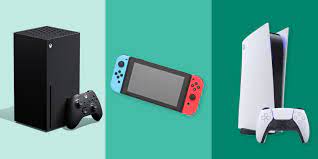
The Ultimate Guide to Gaming Consoles: A Journey Through Virtual Worlds
The Evolution of Gaming Consoles
Gaming consoles have come a long way since their inception, revolutionising the way we play and interact with video games. From the early days of simple pixelated graphics to today’s immersive virtual worlds, gaming consoles have continuously pushed the boundaries of technology and entertainment.
One of the first gaming consoles to capture the public’s imagination was the Atari 2600, released in 1977. With its iconic joystick and cartridge-based games, it paved the way for future consoles to follow. The Nintendo Entertainment System (NES) introduced us to beloved characters like Mario and Zelda, setting a new standard for home gaming.
The evolution continued with the introduction of CD-based consoles like the Sony PlayStation and Sega Saturn, which offered improved graphics and sound quality. The PlayStation 2 became one of the best-selling consoles of all time, showcasing the growing popularity of gaming as a form of mainstream entertainment.
Fast forward to today, and we have powerful consoles like the Xbox Series X and PlayStation 5, capable of delivering lifelike graphics, responsive gameplay, and seamless online experiences. These cutting-edge devices have blurred the lines between reality and virtual worlds, offering players unprecedented levels of immersion.
As technology continues to advance, so too will gaming consoles. With innovations like virtual reality (VR) and cloud gaming on the horizon, the future looks bright for gamers everywhere. Whether you’re a casual player or a hardcore enthusiast, there’s never been a better time to pick up a controller and dive into the world of gaming.
Six Advantages of Gaming Consoles: Exclusive Titles, User-Friendly Setup, and More
- 1. Gaming consoles offer exclusive titles that are not available on other platforms, providing unique gaming experiences.
- 2. Consoles are user-friendly and easy to set up, making them accessible to players of all ages and technical abilities.
- 3. Console games often have better optimisation for performance and graphics compared to PC games, ensuring a smoother gaming experience.
- 4. Consoles typically have a lower entry cost than gaming PCs, making them a more affordable option for many gamers.
- 5. Gaming consoles support local multiplayer gaming, allowing friends and family to play together in the same room.
- 6. Consoles provide a dedicated gaming environment free from distractions like work or web browsing, enhancing the immersive gameplay experience.
Seven Drawbacks of Gaming Consoles: Cost, Limitations, and Connectivity Challenges
- 1. Costly initial investment for high-end consoles.
- 2. Limited upgrade options compared to PC gaming.
- 3. Exclusive game titles may restrict access to certain games.
- 4. Online subscription fees required for multiplayer gaming on some consoles.
- 5. Limited portability compared to handheld gaming devices.
- 6. Risk of overheating and hardware failure over time.
- 7. Dependency on internet connectivity for software updates and online features.
1. Gaming consoles offer exclusive titles that are not available on other platforms, providing unique gaming experiences.
Gaming consoles offer a distinct advantage with their exclusive titles that are not available on other platforms, creating unique and immersive gaming experiences for players. These exclusive games are often developed by top-tier studios and showcase innovative gameplay, captivating storylines, and stunning graphics that can only be enjoyed on specific consoles. This exclusivity adds value to owning a gaming console, enticing players with a diverse range of games that cannot be replicated elsewhere, making each gaming experience truly special and tailored to the console’s capabilities.
2. Consoles are user-friendly and easy to set up, making them accessible to players of all ages and technical abilities.
One of the key advantages of gaming consoles is their user-friendly nature and ease of setup, which makes them accessible to players of all ages and technical abilities. Unlike PCs, which may require technical knowledge to configure and optimise for gaming, consoles are designed to be plug-and-play devices that are ready to use out of the box. This simplicity ensures that even novice players can quickly get started and enjoy their favourite games without any hassle or confusion, making gaming consoles a popular choice for families and individuals looking for a straightforward gaming experience.
3. Console games often have better optimisation for performance and graphics compared to PC games, ensuring a smoother gaming experience.
Console games offer a distinct advantage in terms of optimisation for performance and graphics compared to PC games. This results in a smoother gaming experience for players. By designing games specifically for the hardware of a console, developers can fine-tune the game to run efficiently and take full advantage of the system’s capabilities. As a result, console gamers can enjoy consistently high-quality graphics and seamless gameplay, without having to worry about hardware compatibility or system requirements that can often be a concern when playing on PC.
4. Consoles typically have a lower entry cost than gaming PCs, making them a more affordable option for many gamers.
One significant advantage of gaming consoles is their lower entry cost compared to gaming PCs, making them a more accessible option for many gamers. Consoles often come as a complete package with the necessary hardware and controllers included, eliminating the need for additional components or upgrades that can drive up costs. This affordability makes gaming consoles an attractive choice for those looking to enjoy high-quality gaming experiences without breaking the bank.
5. Gaming consoles support local multiplayer gaming, allowing friends and family to play together in the same room.
One of the key advantages of gaming consoles is their support for local multiplayer gaming, enabling friends and family to come together and enjoy playing games in the same room. This feature fosters social interaction, teamwork, and friendly competition among players, creating memorable bonding experiences that go beyond just playing a game. Whether it’s racing against each other in a virtual world or working together to defeat a common enemy, local multiplayer gaming on consoles encourages face-to-face interaction and shared enjoyment, making it a cherished aspect of gaming culture.
6. Consoles provide a dedicated gaming environment free from distractions like work or web browsing, enhancing the immersive gameplay experience.
Gaming consoles offer a dedicated gaming environment that is free from distractions such as work or web browsing, allowing players to fully immerse themselves in the gameplay experience. By providing a focused space specifically designed for gaming, consoles create an atmosphere where players can escape into virtual worlds without interruptions, enhancing their overall enjoyment and engagement with the game. This exclusive environment helps players to concentrate on the game at hand, leading to a more immersive and rewarding gaming experience.
1. Costly initial investment for high-end consoles.
One significant drawback of gaming consoles is the costly initial investment required for high-end models. While these advanced consoles offer cutting-edge technology, superior graphics, and a wide range of features, their premium price tags can be a barrier for many gamers. The expense of purchasing a high-end console may deter budget-conscious individuals or families from enjoying the latest gaming experiences, as they weigh the cost against other financial priorities. Additionally, the need to invest in additional accessories and games can further add to the overall expense, making it challenging for some to justify the initial outlay for these top-tier gaming systems.
2. Limited upgrade options compared to PC gaming.
One notable downside of gaming consoles is their limited upgrade options compared to PC gaming. Unlike PCs, where components can be easily swapped out and upgraded to keep up with the latest technology, consoles have fixed hardware configurations. This means that once a console is released, its specifications remain the same throughout its lifespan, making it challenging for players to enhance performance or graphical capabilities. As a result, console gamers may find themselves falling behind in terms of technological advancements and missing out on the benefits of customisation that PC gamers enjoy.
3. Exclusive game titles may restrict access to certain games.
One significant drawback of gaming consoles is the restriction imposed by exclusive game titles, limiting access to certain games for players who do not own a specific console. This exclusivity can be frustrating for gamers who are passionate about particular titles but are unable to play them due to platform limitations. As a result, players may miss out on unique gaming experiences and storytelling that are only available on a specific console, creating a barrier to full enjoyment of the gaming landscape.
4. Online subscription fees required for multiplayer gaming on some consoles.
One notable con of gaming consoles is the requirement for online subscription fees to access multiplayer gaming on certain platforms. This additional cost can be a barrier for players who wish to engage in online multiplayer experiences, as it adds an ongoing financial commitment on top of the initial console purchase. For some gamers, this can feel restrictive and may limit their ability to fully enjoy all aspects of their favourite games.
5. Limited portability compared to handheld gaming devices.
One drawback of gaming consoles is their limited portability compared to handheld gaming devices. While handheld devices allow gamers to enjoy their favourite games on the go, consoles are typically bulkier and require a dedicated setup, such as a TV and power source. This lack of portability can be inconvenient for those who want to game outside of their homes or while travelling. Additionally, carrying a console around can be cumbersome and impractical, limiting the flexibility of when and where gamers can indulge in their gaming experiences.
6. Risk of overheating and hardware failure over time.
One significant drawback of gaming consoles is the risk of overheating and hardware failure over time. Due to the intensive processing demands of modern games, consoles can generate a significant amount of heat during gameplay. This prolonged exposure to high temperatures can lead to components wearing out faster and potentially causing system malfunctions or failures. Players may need to take extra precautions, such as ensuring proper ventilation and regular maintenance, to mitigate the risk of overheating and prolong the lifespan of their gaming console.
7. Dependency on internet connectivity for software updates and online features.
One significant drawback of gaming consoles is their dependency on internet connectivity for software updates and online features. While these updates may enhance gameplay and provide access to new content, they can be frustrating for players without a stable internet connection. Additionally, online features such as multiplayer modes and in-game purchases often require an internet connection, limiting the experience for those who prefer offline gaming or live in areas with poor connectivity. This reliance on the internet can create barriers to fully enjoying the gaming console experience for some players.


